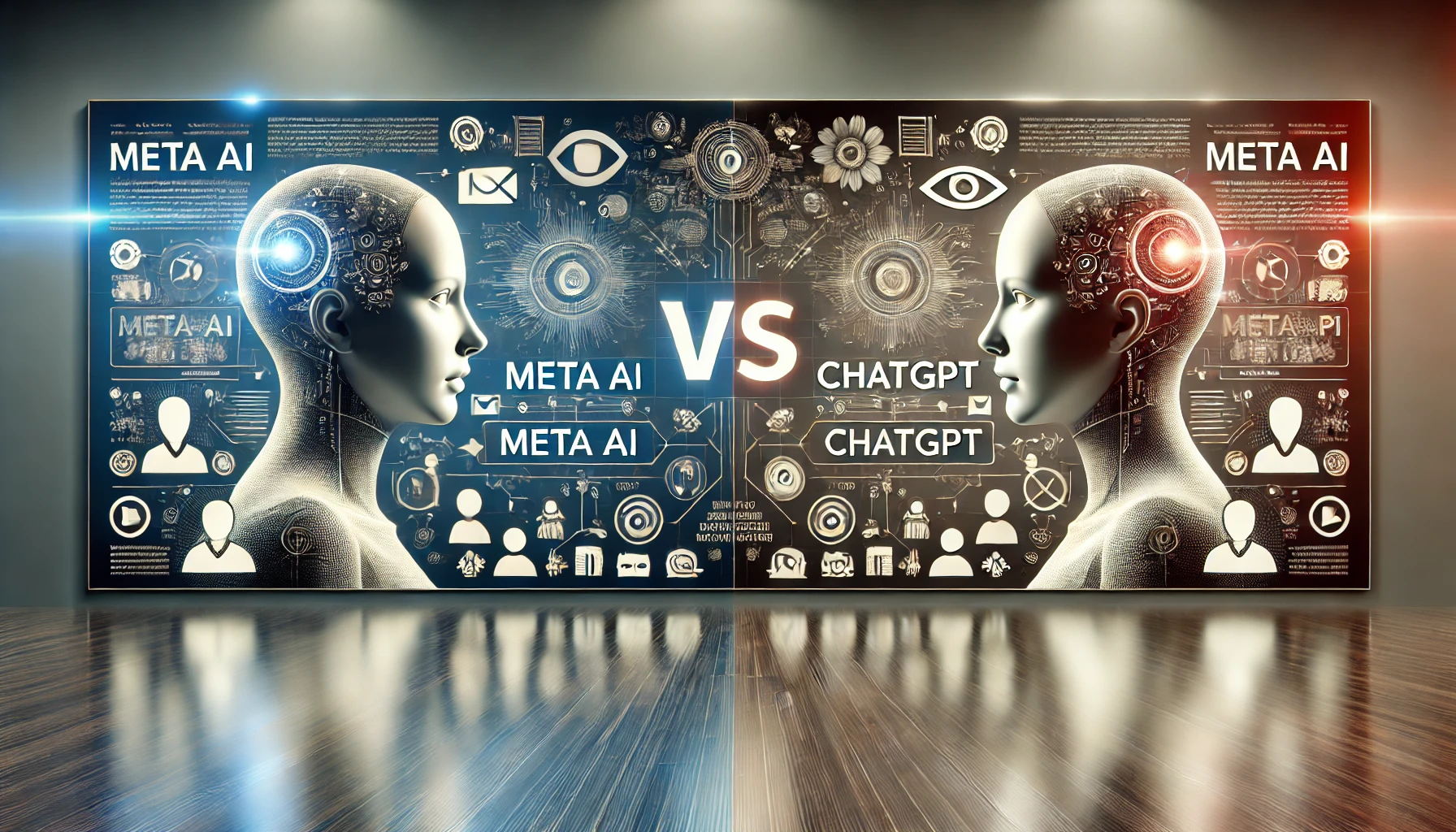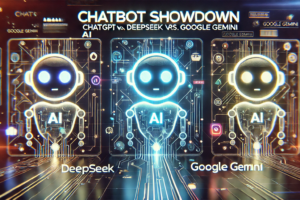Meta AI vs. ChatGPT: How Do These Leading AI Models Compare?
Meta AI vs. ChatGPT: Artificial Intelligence (AI) has become a central part of our digital lives, with models like Meta AI and ChatGPT leading the charge in transforming how we interact with technology. Both AI models are at the forefront of innovation, but they cater to different needs and are built on distinct philosophies. In this blog, we’ll dive deep into the comparison between Meta AI and ChatGPT, examining their capabilities, features, performance, and suitability for business applications. By the end of this post, you’ll have a clear understanding of how these AI giants stack up against each other.
Meta AI vs. ChatGPT: The Battle of AI Titans
When discussing AI, the comparison between Meta AI and ChatGPT is inevitable. These two models represent the pinnacle of AI technology from two of the world’s most influential tech companies: Meta (formerly Facebook) and OpenAI. But what sets them apart?
What is Meta AI?
Meta AI is a cutting-edge artificial intelligence platform developed by Meta, focusing on machine learning, natural language processing (NLP), and computer vision. Meta AI is designed to integrate seamlessly with Meta’s ecosystem, including Facebook, Instagram, and WhatsApp, providing users with enhanced experiences through personalized recommendations, content moderation, and automated responses.
What is ChatGPT?
ChatGPT, developed by OpenAI, is a powerful language model that excels in generating human-like text based on the input it receives. It is part of the broader GPT (Generative Pre-trained Transformer) family, with GPT-4 being the latest version. ChatGPT is known for its ability to engage in conversations, answer questions, write essays, and even create code, making it a versatile tool for various applications.
Key Differences Between Meta AI and ChatGPT
While both Meta AI and ChatGPT are based on advanced machine learning techniques, they differ in their core objectives. Meta AI is deeply integrated into Meta’s social media platforms, focusing on improving user interaction and experience within those ecosystems. ChatGPT, on the other hand, is a standalone model that is widely used across different domains, from customer service to content creation.
Performance Showdown: Meta AI vs. ChatGPT – Which AI Model Delivers Better Results?
Performance is a critical factor when comparing AI models, as it determines how well they can handle real-world tasks. In the Meta AI vs. ChatGPT performance debate, each model has its strengths and areas where it excels.
Meta AI Performance
Meta AI is optimized for large-scale applications, particularly in social media and content moderation. It uses sophisticated algorithms to filter harmful content, detect misinformation, and recommend content that aligns with user preferences. Meta AI’s performance shines in environments where real-time processing and scalability are crucial.
- Strengths:
- High scalability for handling millions of users simultaneously.
- Advanced content filtering and moderation capabilities.
- Integration with social media platforms enhances user experience.
ChatGPT Performance
ChatGPT, particularly the GPT-4 version, is renowned for its natural language understanding and generation capabilities. It performs exceptionally well in tasks that require coherent, context-aware text generation. Whether it’s answering complex questions, generating creative content, or holding a conversation, ChatGPT’s performance is impressive.
- Strengths:
- Superior natural language processing and generation.
- Versatile across various domains and applications.
- Highly responsive to user inputs, providing relevant and contextually accurate answers.
Which Performs Better?
The choice between Meta AI and ChatGPT largely depends on the specific application. For businesses looking to enhance social media interactions, Meta AI might be the better option due to its integration within Meta’s platforms. However, for tasks requiring advanced text generation and natural language understanding, ChatGPT outperforms Meta AI.
Features and Accuracy Comparison: Meta AI vs. ChatGPT
Features and accuracy are crucial when evaluating AI models, as they directly impact user satisfaction and the effectiveness of the AI in delivering results.
Meta AI Features
Meta AI is designed with features that enhance user engagement on social media platforms. These include content recommendation engines, automated customer support, and advanced content moderation tools. Meta AI also supports features like real-time translation and voice recognition, making it a comprehensive tool for enhancing digital interactions.
- Key Features:
- Content recommendation and personalization.
- Automated content moderation.
- Real-time translation and voice recognition.
- Integration with Meta’s suite of apps.
ChatGPT Features
ChatGPT offers a wide range of features, primarily focused on text-based interactions. It excels in generating human-like text, making it ideal for chatbots, virtual assistants, and content creation tools. ChatGPT’s features include the ability to generate long-form content, answer complex queries, and even simulate conversations for training purposes.
- Key Features:
- Advanced natural language generation.
- Context-aware text responses.
- Versatility across multiple industries.
- Customization options for different applications.
Accuracy: Meta AI vs. ChatGPT
Accuracy is a critical metric for AI models. Meta AI’s accuracy is particularly high in content filtering and moderation, where it can identify and remove harmful content with precision. However, when it comes to generating accurate, contextually appropriate text, ChatGPT holds the advantage. Its ability to understand and generate nuanced text makes it more accurate in language-based tasks.
- Meta AI: High accuracy in content moderation and real-time processing.
- ChatGPT: Superior accuracy in natural language processing and text generation.
Meta AI vs. ChatGPT for Business: Which AI is Better for Your Business?
Choosing between Meta AI and ChatGPT for business applications depends on your company’s specific needs. Both AI models offer unique advantages that can drive business success, but they cater to different aspects of business operations.
Meta AI for Business
Meta AI is particularly beneficial for businesses that rely heavily on social media marketing and customer engagement. Its ability to analyze user behavior and deliver personalized content makes it a powerful tool for improving customer experience. Additionally, Meta AI’s content moderation features help maintain brand integrity by filtering inappropriate content.
- Ideal For:
- Social media marketing.
- Customer engagement and support.
- Content moderation and brand protection.
ChatGPT for Business
ChatGPT is a versatile tool that can be integrated into various business processes. It’s particularly useful for customer support, where it can handle customer inquiries efficiently, reducing the need for human intervention. ChatGPT is also an excellent tool for content creation, allowing businesses to generate high-quality articles, reports, and even marketing copy with ease.
- Ideal For:
- Customer support and virtual assistants.
- Content creation and marketing.
- Training and simulation environments.
Meta AI vs. ChatGPT: Which is the Best Alternative?
For businesses looking for an alternative to traditional AI models, both Meta AI and ChatGPT present compelling options. Meta AI is an excellent alternative for companies heavily invested in social media, while ChatGPT offers a broader range of applications, making it a more versatile choice.
A Comprehensive Analysis: Meta AI vs. ChatGPT – Breaking Down the Differences
To summarize the comparison between Meta AI and ChatGPT, it’s essential to break down the differences in technology, applications, and future potential.
Technology
Meta AI is built on a foundation of machine learning and deep integration with Meta’s platforms, making it highly specialized for social media applications. ChatGPT, on the other hand, leverages the power of the GPT architecture, making it highly adaptable and effective in generating human-like text across various domains.
Applications
Meta AI excels in environments where user engagement and content moderation are priorities. It’s designed to enhance the social media experience by providing personalized content and protecting users from harmful material. ChatGPT’s applications are more diverse, ranging from customer service to creative content generation, making it suitable for businesses across multiple industries.
Future Potential
Both Meta AI and ChatGPT are at the forefront of AI innovation, with promising futures. Meta AI will likely continue to evolve within the social media space, while ChatGPT’s flexibility positions it for expansion into new areas, including healthcare, education, and entertainment.
Meta AI vs. ChatGPT – Which AI Model Should You Choose?
In the Meta AI vs. ChatGPT debate, there’s no one-size-fits-all answer. The choice depends on your specific needs and how you plan to use AI within your organization. Meta AI is the go-to solution for businesses focused on social media and content moderation, while ChatGPT offers unparalleled versatility for text-based applications.
Both models represent the cutting edge of AI technology, and as they continue to evolve, they will undoubtedly play a significant role in shaping the future of digital interactions.
For more insights into the world of AI and to explore how these technologies can benefit your business, be sure to visit Regent Studies.
External Reference:
Choosing between Meta AI and ChatGPT is a decision that should align with your business goals, whether that means enhancing customer interactions or generating high-quality content.




